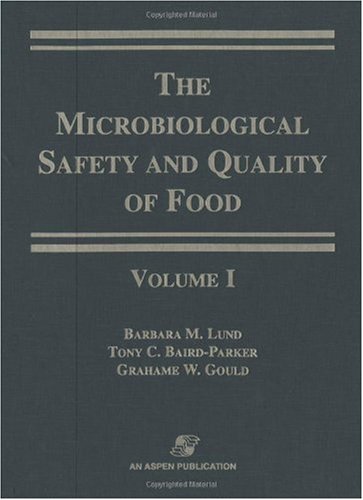Barbara M. Lund, Tony C. Baird-Parker, Grahame W. Gould (editors)0834213230, 9780834213234
Table of contents :
Front Matter……Page 2
Contributors……Page 5
Foreword……Page 10
Preface……Page 12
Contents……Page 13
Part I. Principles and Application of Food Preservation Techniques……Page 30
1. The Production of Microbiologically Safe and Stable Foods……Page 32
2. Strategies for Food Preservation……Page 48
3. Heat Treatment……Page 65
4. Irradiation……Page 94
5. Chill Storage……Page 130
6. Freezing……Page 151
7. Drying and Reduction of Water Activity……Page 175
8. Control of pH and Use of Organic Acids……Page 204
9. The Use of Other Chemical Preservatives: Sulfite and Nitrite……Page 229
10. Modified Atmospheres……Page 243
11. The Effect of Redox Potential……Page 264
12. Microorganisms and Their Products in the Preservation of Foods……Page 280
13. New and Emerging Physical Methods of Preservation……Page 306
14. Use of Combined Preservative Factors in Foods of Developing Countries……Page 323
15. Injured Bacteria……Page 344
16. Principles and Application of Predictive Modeling of the Effects of Preservative Factors on Microorganisms……Page 371
Part II. Microbial Ecology of Different Types of Food……Page 388
17. Fresh Red Meats……Page 390
18. Processed Meat Products……Page 418
19. Fermented Meats……Page 449
20. Fresh and Further-Processed Poultry……Page 474
21. Fresh and Processed Fish and Shellfish……Page 501
22. Milk and Unfermented Milk Products……Page 536
23. Fermented Milk Products……Page 564
24. Eggs and Egg Products……Page 619
25. Fresh and Processed Vegetables……Page 649
26. Fermented and Acidified Plant Foods……Page 714
27. Fresh and Processed Fruits……Page 767
28. Cereals and Cereal Products……Page 788
29. Yellow Fat Products (Butter, Margarine, Dairy and Nondairy Spreads)……Page 813
30. Mayonnaise, Dressings, Mustard, Mayonnaise-Based Salads, and Acid Sauces……Page 836
31. Fruit Juices, Fruit Drinks, and Soft Drinks……Page 865
32. Bottled Water……Page 899
33. Spices and Herbs……Page 926
34. Nuts and Nut Products……Page 948
35. Sugars, Honey, Cocoa, Chocolate, and Confectionery Products……Page 970
36. Teas, Herbal Teas, and Coffee……Page 989
Part III. Foodborne Pathogens……Page 1002
37. Surveillance of Foodborne Disease……Page 1004
38. The Aeromonas Hydrophila Group……Page 1040
39. Bacillus Species……Page 1058
40. Campylobacter……Page 1069
41. Clostridium Botulinum……Page 1086
42. Clostridium Perfringens……Page 1139
43. Escherichia Coli……Page 1165
44. Listeria Monocytogenes……Page 1207
45. Salmonella……Page 1262
46. Shigella Species……Page 1329
47. Staphylococcus Aureus……Page 1346
48. Vibrio Species……Page 1365
49. Yersinia Species……Page 1392
50. Less Recognized and Suspected Foodborne Bacterial Pathogens……Page 1423
51. Protozoa……Page 1449
52. Foodborne Viruses……Page 1486
53. Toxigenic Fungi and Mycotoxins……Page 1519
54. Fish and Shellfish Poisoning……Page 1547
55. Long-Term Consequences of Foodborne Disease……Page 1574
56. The Economic Costs of Foodborne Disease……Page 1592
57. Transmissible Spongiform Encephalopathies……Page 1618
Part IV. Assurance of the Microbiological Safety and Quality of Foods……Page 1654
58. Good Manufacturing Practice, HACCP, and Quality Systems……Page 1656
59. Hygienic Design of Factories and Equipment……Page 1685
60. Sampling for Microbiological Analysis……Page 1720
61. Detection of Microorganisms in Foods: Principles of Physical Methods for Separation and Associated Chemical and Enzymological Methods of Detection……Page 1763
62. Detection of Microorganisms in Foods – Principles of Culture Methods……Page 1790
63. Detection of Microorganisms in Food – Principles and Application of Immunological Techniques……Page 1820
64. Principles and Applications of Genetic Techniques for Detection, Identification, and Subtyping of Food-Associated Pathogenic Microorganisms……Page 1842
65. Risk and Microbiological Criteria……Page 1881
Index……Page 1915

Reviews
There are no reviews yet.